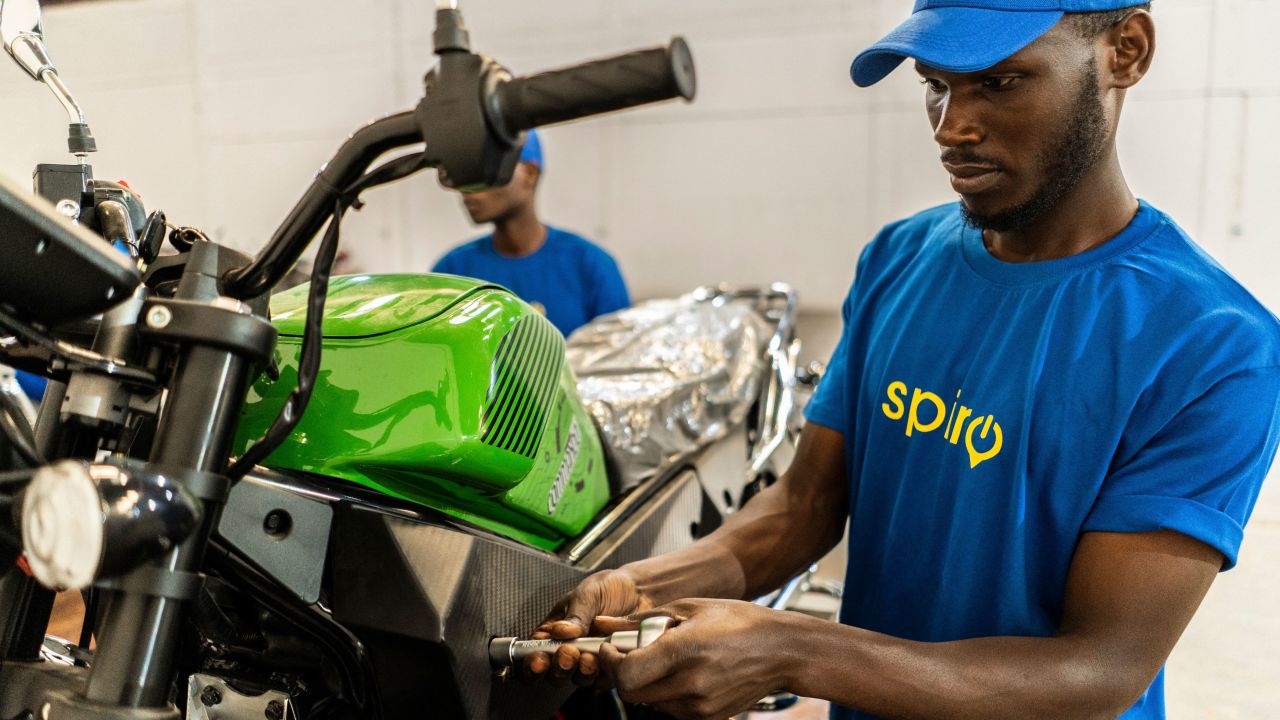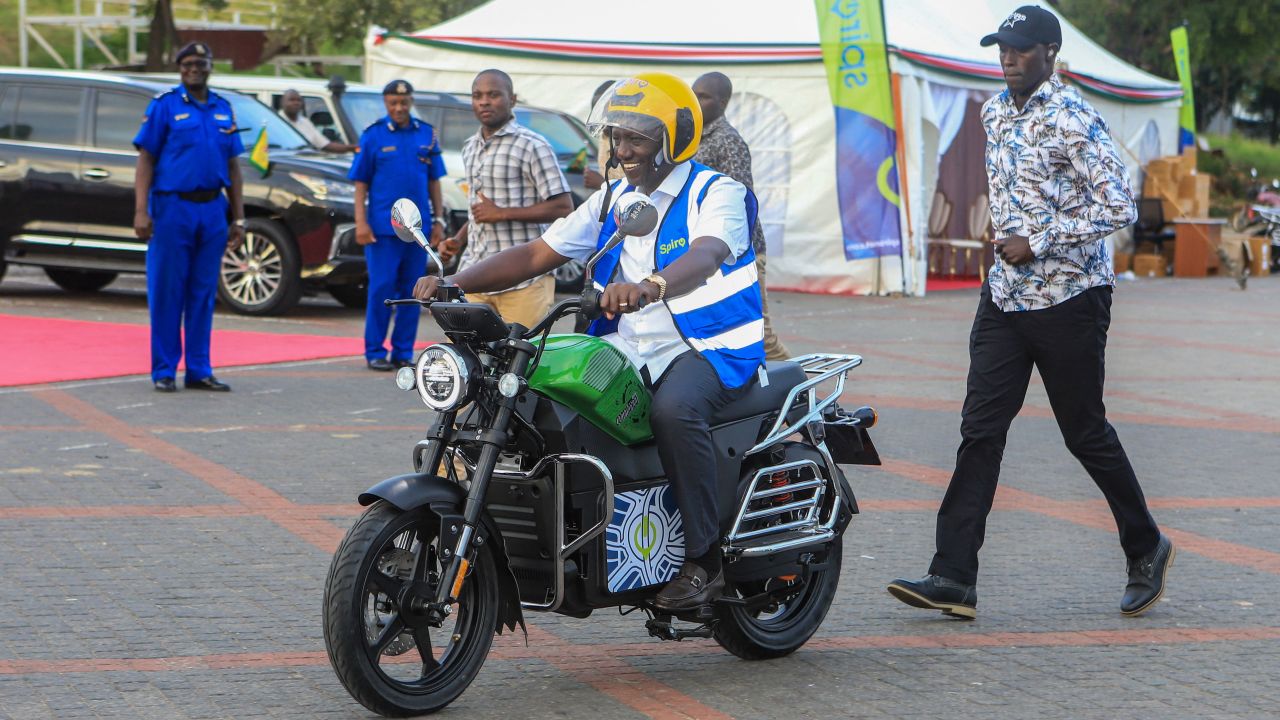
Spiro, a business outlet that wants to replace gas-guzzling motorbikes and scooters with electric two-wheelers on the roads, is expanding to Kenya.
The host government revealed on Friday that the e-bike and battery-swapping firm would be joining the East African nation with its largest deployment yet: 1.2 million electric vehicles. The first Africa Climate Summit began today in Nairobi, the capital of Kenya.
According to CEO Jules Samain, the company, which was created in Benin in 2022, has reached a significant milestone by significantly expanding its fleet from the 10,000 bikes that are already in use throughout Benin, Togo, and Rwanda. The company will also start rolling out 140,000 motorcycles in Uganda over a five-year period from September.
Crushing Down polluters.
According to Samain, Spiro wants to “eliminate pollution sources, not just reduce them.” He adds that the business has hosted “crushing events” in Benin and Togo, when motorised vehicles are openly flattened before the material is reused. Once an old bike has been traded in, the pieces will be recycled and put to new uses.
The procedure for drivers varies by nation. Drivers can then use battery-swap stations by paying a daily subscription of approximately 255 Kenyan shillings (about $2), which pays off the unpaid balance and grants them access. At these stations, they can swiftly swap out discharged batteries for fully charged ones.
According to the corporation, the programme not only lowers the number of petrol and diesel vehicles on the road and the resulting air pollution, but it also lowers fuel and maintenance expenses for drivers. The firm reports that some of its motorcycle taxi drivers have seen increases in their daily earnings of between $6 and $11 since joining the programme.

According to a 2022 research from the FIA Foundation, a global organisation that promotes road safety and transportation, although the cost to buy an electric motorbike is now higher than a petrol-powered motorbike, running costs are lower. According to the article, one litre of gasoline costs five to ten times more than one kilowatt-hour of electricity but will propel a bike the same distance in several African nations.
According to the paper, battery-swapping programmes are crucial for lowering the price of electric two-wheelers since they allow for a motorcycle’s initial purchase price to be greatly reduced.
However, according to Samain, “reliable and accessible charging infrastructure” is required for battery swapping to function. “We build a network of swapping stations before distributing the first bike, and we don’t place them randomly: we carefully study the terrain and position our swapping stations in both urban and rural areas, ensuring extensive coverage.”
Drivers can put an end to range anxiety because to Spiro’s commitment to constructing 3,000 of these charging stations throughout Kenya, and they can also help the country’s electric vehicle infrastructure grow. The business, which presently produces the majority of its motorcycles and scooters in China, has also consented to set up a manufacturing site in Kenya in order to create jobs for locals.
At the initiative’s introduction in Mombasa, Kenya’s coastal city, President William Ruto said: “It creates jobs and transfers knowledge, technology, and skills to our market in a very sustainable way.”
 President William Ruto riding a Spiro electric motorcycle at the national launch of the initiative in Mombasa, Kenya.
President William Ruto riding a Spiro electric motorcycle at the national launch of the initiative in Mombasa, Kenya.
Charging Ahead.
Approximately 80% of the 27 million motorbikes registered in sub-Saharan Africa in 2022, up from just 5 million in 2010, would be used in the motorcycle taxi business, according to the FIA Foundation. According to a report by management consulting firm McKinsey, the total vehicle fleet in sub-Saharan Africa would consist of more than 45% electric and gasoline motorbikes by 2040, indicating that the demand for two-wheelers will continue to rise.
McKinsey cautions that with rising demand, used motor cars that don’t adhere to pollution norms in other nations may end up being marketed in Africa, where regulations are lax. Enabling accessible and trustworthy electrification will be essential, it claims, to prevent the continent from turning into a “dumping ground” for unwanted polluting vehicles.
The startup Spiro, then known as M-Auto, is only one of those driving this change. East Africa’s largest electric motorcycle assembly plant was opened earlier this year by the Swedish-Kenyan startup Roam (formerly Opibus), which converts old vehicles to run on electric motors. Ampersand has a fleet of about 1,000 bikes as well as a modest network of battery-swap stations throughout Kenya and Rwanda. With plans to roll out 3,000 bikes in the next six months, US giant Uber also launched an electric motorbike service in Kenya last week.

However, Spiro’s expansion in Kenya will eclipse all current fleets in size. Samain claims that “we are approaching the symbolic but important milestone of one million electric bikes signed with a government.” By 2030, He wants the firm to be functioning in at least 10 African nations by 2030, and it has its foot on the accelerator.
Source: CNN.









